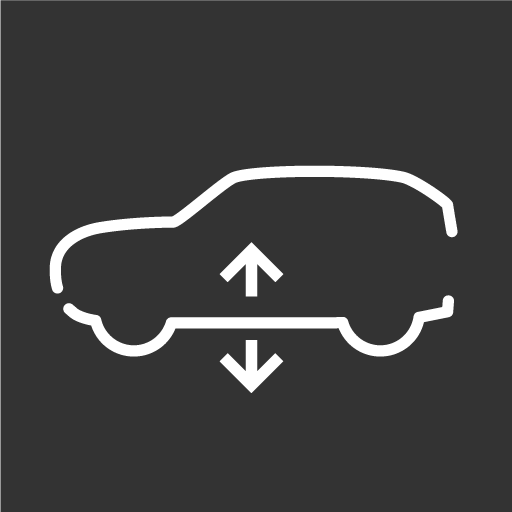Shock absorption (Four-C)*
On a car equipped with Four-C, the shock absorption is adapted according to the suspension setting selected and the speed of the car. Shock absorption is normally set for optimum comfort and is regulated continuously depending on road surface, car acceleration, braking and cornering. If a firmer chassis is required, the suspension setting should be set to Suspension feel firm.
Manually adjustable shock absorbers*
Polestar Engineered* variant cars have the option to adjust the shock absorbers manually. There are three recommended positions: performance position, dynamic position and comfort position.
Performance position
The performance position means that the car's shock absorption feels harder.
Dynamic position
Dynamic position is the car's factory setting that is adapted for daily driving.
Comfort position
Comfort position means that the car's shock absorption feels softer.
Level control and shock absorption
The system is adapted according to the selected drive mode and according to the speed of the car. Using level control, the car's ground clearance is adjusted to a lower level at higher speeds, which reduces wind resistance and increases stability. Shock absorption is normally set for optimum comfort and is regulated continuously depending on the road surface, the car's acceleration, braking and cornering.

The driver display indicates when level control is in progress.
- If a side door is open, the level can only be regulated upwards.
- If the tailgate is open, the level can only be regulated downwards.
During parking
During parking, make sure you allow adequate space above and below the car since the car's ground clearance may vary e.g. depending on the outside temperature, how the car is loaded, the use of loading mode or the drive mode that is selected after starting.
The level may also be adjusted some time after the car has been parked. This is to compensate for any changes in height that may occur due to temperature changes in the air springs when the car cools down.
During transport
During transport of the car on a ferry, train or truck, the car must be lashed around the tyres and not around other parts of the chassis. Changes in the level control may occur during transport, which could have a negative effect on the lashing.
Symbols and messages
If a fault arises with the level control, a message is shown in the driver display.
| Symbol | Message | Specification |
|---|---|---|
 | Suspension Deactivated by user | The active self-levelling has been switched off manually by the user. |
 | Suspension Temporarily reduced performance | The performance of the active self-levelling has been temporarily reduced due to extensive system use. |
 | Suspension Service required | A fault has occurred. Visit a workshop1 as soon as possible. |
 | Stop safely Suspension failure | A critical fault has occurred. The car's driving performance is significantly reduced, stop safely. Have the car transported (raised with all wheels on the flat-bed) to a workshop1 if the message is shown when the car is stationary. |
 | Slow down Suspension Car too high | A fault has occurred. The car's driving performance is reduced, slow down until the symbol disappears. Contact a workshop1 if the message is shown when the car is stationary. |
 | Suspension Auto adjusting car level | Level control to target height in progress. |